新概念英语第二册第1课课件.ppt
新概念英语第二册第一课

Attention
n. 注意
Attention, please. pay a little/some/more/no /close/great/enough attention pay attention to sth draw one’s attention That’s all, thank for your attention
6. He had a good seat. He was sitting in a good( ). A. chair b. place c. armchair d. class 7. He was a young man. He wasn’t very ( ) A. old b. big c. tall. d. large 8. The writer looked at the man and the woman angrily. He was very ( ) A. sad b. unhappy c. cross d. pleased 9. The writer could not bear it. He could not ( )it. A. carry b. suffer c. stand d. lift 10. The young man spoke rudely. He wasn’t very A. clever b. rude c. polite d. kind
Where there is a will, there is a way.
言归正传Get down to business
Lesson 1
A
private conversation
新概念英语第二册第一课最全讲义
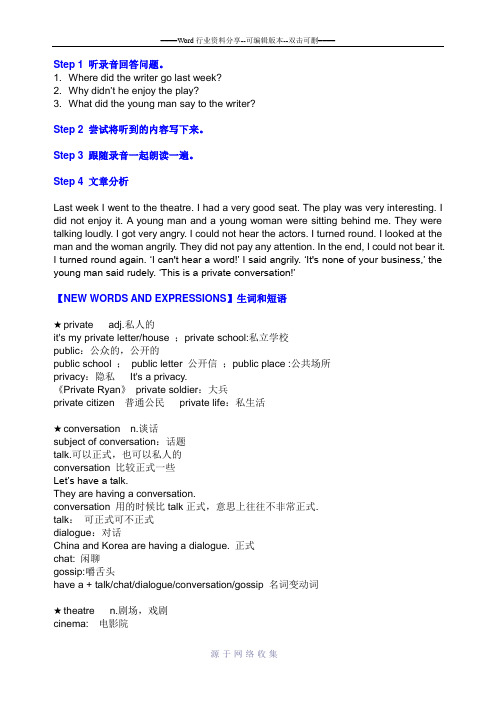
Step 1 听录音回答问题。
1. Where did the writer go last week?2. Why didn’t he enjoy the play?3. What did the young man say to the writer?Step 2 尝试将听到的内容写下来。
Step 3 跟随录音一起朗读一遍。
Step 4 文章分析Last week I went to the theatre. I had a very good seat. The play was very interesting. I did not enjoy it. A young man and a young woman were sitting behind me. They were talking loudly. I got very angry. I could not hear the actors. I turned round. I looked at the man and the woman angrily. They did not pay any attention. In the end, I could not bear it.I turned round again. ‘I can't hear a word!’ I said angrily. ‘It's none of your business,’ the young man said rudely. ‘This is a private conversation!’【NEW WORDS AND EXPRESSIONS】生词和短语★private adj.私人的it's my private letter/house ;private school:私立学校public:公众的,公开的public school ;public letter 公开信;public place :公共场所privacy:隐私It's a privacy.《Private Ryan》private soldier:大兵private citizen 普通公民private life:私生活★conversation n.谈话subject of conversation:话题talk.可以正式,也可以私人的conversation 比较正式一些Let’s have a talk.They are having a conversation.conversation 用的时候比talk正式,意思上往往不非常正式.talk:可正式可不正式dialogue:对话China and Korea are having a dialogue. 正式chat: 闲聊gossip:嚼舌头have a + talk/chat/dialogue/conversation/gossip 名词变动词★theatre n.剧场,戏剧cinema: 电影院★seat n.座位have a good seat(place)take a seat : 座下来,就座take your seat/take a seatIs the seat taken? 这个座位有人吗?no/yessit Sit down ,pleaseseat Take your seat, please.Be seated, please 更为礼貌seat是及物动词,后面有宾语sit是不及物动词,后面不加宾语seat后面会加人; seat sb; seat him; seat:让某人就座sit he is sitting there.you seat him;〖语法精粹〗When all those present__, he began his lecture.A. sitB. seatC. seatedD. were seatedsit, sit down; seat, be seated; take a seat★play n.戏★loudly adv. 大声的★angry adj. 生气的cross=angry ; I was angry. He was cross.Don't get cross with me, it wasn't my fault.不要对我生气,那不是我的错。
新概念英语第二册_lesson_1
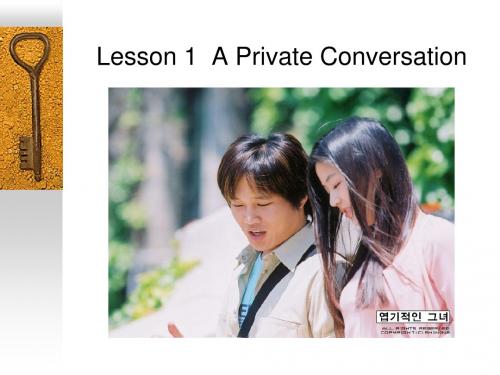
attention
[经典用法] pay attention to sb/sth
[比较学习]
notice
不用心去看 attention 用心去盯着 [口语应用] Attention, please! 请大家注意! Attention! 立正! At ease! 放松!
1. Last week I went to the theatre.
[参考翻译] 上个星期,我去了戏院看戏。
[语言点1] 时间状语开门见山,过去的时
间用过去时态顺理成章。故将go改为 went。 [语言点2] 在theatre,cinema,pictures等词 之前一定要加定冠词the。
3. The play was very interesting.
[参考翻译] 那场戏剧演得非常有意
思。 [语言点] very 为副词,interesting为 形容词,副词修饰形容词一般放在 其前面。 比如: very hot非常热, quiet easy 十分简单,但good enough 为例外。
with sb I had a long conversation with my father yesterday afternoon. have a conversation about sth Shall we have a conversation about your vacation ?
例如:
go to the theatre = go to the play去看戏 go to the cinema 去看电影(英式英语) go to the movies 去看电影(美式英语) go to the pictures/films 去看电影 be at the theatre/cinema 在戏院看戏/在
新概念英语第二册 第一课- 第四课
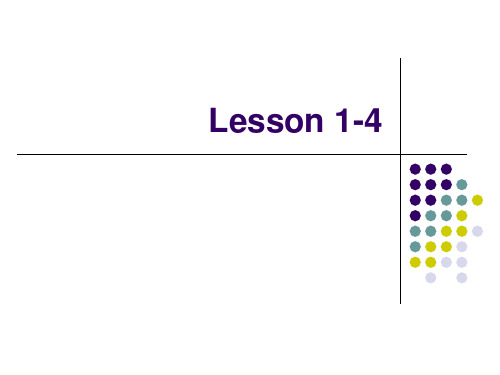
★angry adj. 生气的 ★angrily adv. 生气的 angry =cross I was angry. /He was cross. annoyed: 恼火的; be blue in the face 脸上突然变色 程 I was annoyed. 度 I was angry/cross. 加 I was very angry. 深 I am blue in the face.
11 The writer could not bear it. He could
not __C____ it.
a. carry
b. suffer
c. stand
d. lift
bear 忍受=stand suffer 遭受,忍受 (精神或肉体上)痛苦, suffer后面必须加一种痛苦 I suffer the headache.(肉体上的痛苦) He often suffers defeat.(精神上的痛苦)
Lesson 1-4
Lesson 1 A private conversation
★private adj.私人的 ① adj. 私人的 private life 私生活 private school 私立学校 It's my private letter. It's my private house. ② adj. 普通的 private citizen 普通公民 我是一名公民。
6、In the end, I could not bear it.
in the end :最后,终于,表示一段较长的 时间之后或某种努力之后 她努力独立完成作业。但最后她还是让她 弟弟帮了忙。 She tried hard to finish her homework by herself. In the end, she had to ask her brother for help.
新概念二第一课课件Lesson 1 A private conversation

4. seat n.座位 v.安排坐下,使就坐 have a seat/take a seat 就座 (比sit down更有礼貌) have a good seat 有一个好位置 辨析:seat/sit seat只做及物动词,sit可做及物动词也可做 不及物动词 be seated 坐着,坐下;位于
新概念英语 二
welcome
主讲老师:Arthur
新概念英语二
新概念英语第二册共计96课,分4个单元(每24课一 个单元)前两个单元是对新一语法的操练和重现;第三 个单元较难,是一些复合句,第四个单元为复习单元, 每单元有一个综合考试。 新二是我们学习英语的一个过渡,同时也是一个转变。 从一个会说日常英语的人转变成一个敢动笔进行基本写 作的人。以96篇小故事为素材,培养学生听、说、读、 写的基本能力,其优势在于扩充词汇、统揽语法、集合 实践、听说兼修。在掌握第一册基本语法的基础上,由 浅入深逐步讲解语法要点,使学习者轻松掌握枯燥的语 法;通过对句型结构的分析及对短语用法的讲解,使学 习者在真正的听说读写中运用地道的句型。
问题是你想要做什么
二、主语———动词 在这一句型中,动词为不及 物动词及不及物的动词词组。在有的句子中,不 及物动词可以有状语修饰。 1.The sun is rising. 2.I'll try. 3.Did you sleep well?(well做状语,修饰不及物 动词sleep) 4.The engine broke down. 注意:在此句型中, 有少数不及物动词表达被动含义,表达主语本身 所具有的特性,不用被动语态。 1.The book sells well. 2.The window won't shut. 3.The pen writes smoothly.
新概念英语第二册第1课

1、Last week I went to the theatre.
• 动词go的原义是离开一个地方去另一个地方,与介 词to连用后,常加上主语所要去的目的来代表主语 的动作目的。 • go to the +地点 表示去某地干嘛 • go to the theatre = go to the theatre to see a play去剧 场看戏 • go to the cinema =see a film 去电影院看电影 • go to the dairy 去牛奶店 • go to the + 人 + 's 表示去这个人开的店 • go to the doctor's 去看病;go to the butcher's 买肉
Lesson 1
A Private Conversation
Last week I went to the theatre. I had a very good seat. The play was very interesting. I did not enjoy it. A young man and a young woman were sitting behind me.They were talking loudly. I got very angry. I could not hear the actors. I turned round. I looked at the man and the woman angrily. They did not pay any
★business n. 事, 生意
• • • • • • • • ① n. 生意 business man :生意人 do business: 做生意 go to some place on business:因公出差 I went to Tianjin on business. ② n. 某人自己的私人的事情 It's my business. (指私人的事, 自己处理的事) It's none of your business. 不关你的事。
新概念英语第二册Lesson1课件
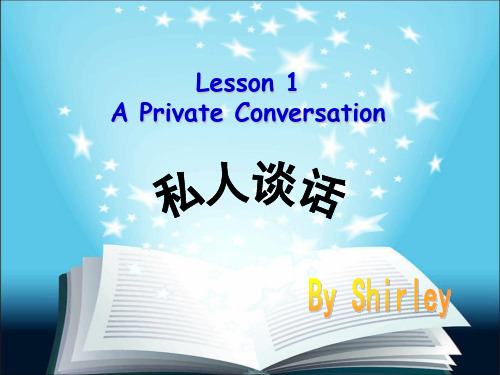
I could not hear the actors.
Key structures and usage
过去进行时:过去某个时间正在进行 或发生的动作 A young and a young woman were sitting behind me.
They were talking loudly.
• • • • • • • • • • • • • • •
【Key structures】 简单陈述句的语序 陈述句一定是有主语,有动词,有宾语,有句号 6 1 2 3 4 5 6 when? Who? Action Who? How? Where? When? Which? Which? What? What? 1 ---主语,一般由名词、代词或名词短语构成,通常位于动词之前,动词必 须与主语一致,即主语决定动词的单复数形式 2 ---谓语,由动词充当 3 ---宾语,一般为名词、代词或名词短语 4 ---副词或介词短语,对方式或状态提问,往往做状语 I like her very much 5 ---地点状语,一般在方式副词之后,时间副词之前 6 ---时间状语,可以放在句首或句末 简单陈述句一定不能少的是主语, 谓语. 如果问何时何地,是一个固定搭配 when and where
• • • • • •
★business n. 事, 生意 ① n. 生意 business man :生意人 do business: 做生意 ② n. 某人自己的私人的事情 It's my business. (指私人的事, 自己处理的 事) • It's none of your business. 不关你的事。
Language points
以下短语中名词前不加冠词:
新概念第二册ppt课件

• 以下短语中名词前不加冠词与加冠词意思有区别 • go to school 去上学; go to the school 去学校; • go to hospital去看病; go to the hospital去医院
3、I did not enjoy it. enjoy vt. 欣赏,享受,喜爱 ① enjoy +n. 喜欢,从当中得到一种享受(后面不能跟人) eg. I enjoy the music. enjoy the dinner\film\game ② enjoy oneself/代词 玩的开心 eg. We always enjoy ourselves. ③ enjoy +动名词 eg. Jane doesn’t enjoy swimming.
【课文讲解】
1、Last week I went to the theatre. • go to the +地点 表示去某地干什么事 • go to the theatre = go to the theatre to see a play去剧 场看戏 • go to the cinema =see a film 去电影院看电影
+ to sb. \ sth.
★business n. 事, 生意 • ① n. 生意 • businessman 生意人 • businesswoman • do business: 做生意 • go to some place on business:因公出差 eg. I went to Tianjin on business.
新概念英语第二册第一课(包含课文、练习及答案)
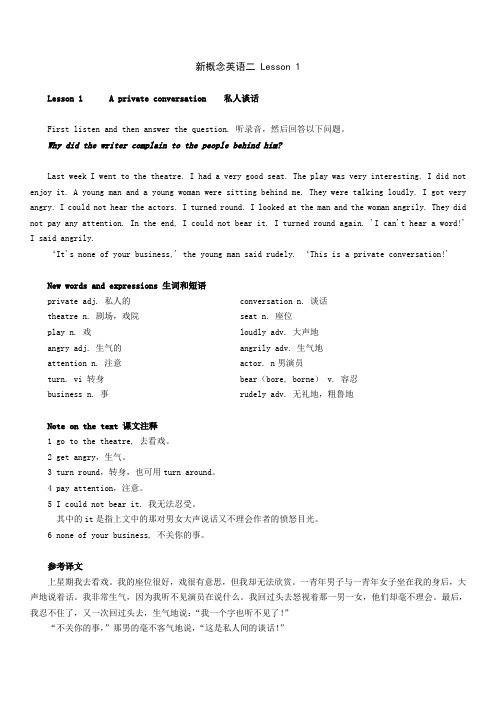
新概念英语二 Lesson 1Lesson 1 A private conversation 私人谈话First listen and then answer the question. 听录音,然后回答以下问题。
Why did the writer complain to the people behind him?Last week I went to the theatre. I had a very good seat. The play was very interesting. I did not enjoy it. A young man and a young woman were sitting behind me. They were talking loudly. I got very angry. I could not hear the actors. I turned round. I looked at the man and the woman angrily. They did not pay any attention. In the end, I could not bear it. I turned round again. 'I can't hear a word!' I said angrily.‘It's none of your business,' the young man said rudely. ‘This is a private conversation!'New words and expressions 生词和短语private adj. 私人的 conversation n. 谈话theatre n. 剧场,戏院 seat n. 座位play n. 戏 loudly adv. 大声地angry adj. 生气的 angrily adv. 生气地attention n. 注意 actor. n男演员turn. vi 转身 bear(bore, borne) v. 容忍business n. 事 rudely adv. 无礼地,粗鲁地Note on the text 课文注释1 go to the theatre, 去看戏。
新概念英语第二册-第一课
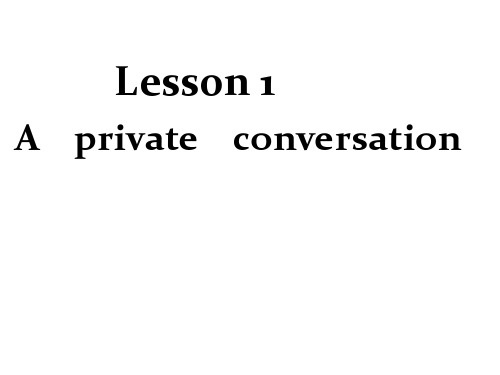
5. _W__a_s_____ (be) it cold in your city
yesterday?
过去进行时
表示在过去某一时刻或某一段时间
内正在进行或发生的动作。
1.构成 : “主语+was/were + 现在分词” 2. 否定形式: “主语+was/were not +现在分词” 3. 疑问句形式: “was/were + 主语+ 现在分词”
He went to the theater. 2. Why did the writer complain
(抱怨)to the people behind
him?
Because they were talking loudly.
Turn to P15 两道选择理解题
讲解课文 P15 句型和词汇选择题
陈述句:陈述一个事实,句末用句 号,分为肯定句和否定句。
简单陈述句:陈述一个事实的简单 句
主语+谓语动词+宾语+ 状语(时间/地点/方式)
时间状语即可以放在句首 也可以放句尾
汉语的语序: 什么人+什么时间+什么地点+怎样做+为什么做+做什么
我爸爸今天早上在家里很认真地为我做了一个汽车模型。
英语的语序: 什么人+做什么+为什么做+怎样做+什么地点+什么时间
My father made a car model for me carefully at home this morning.
做P14 B 句子排序 做P15最下面 句子排序
Grammar: 一般过去时
新概念英语第二册第一课-PPT

business [ˈbɪznɪs]
n. 事
rude rudely
[ruːd] [ˈruːdli]
adj. 粗鲁的 adv. 粗鲁地
1、What did the writer do last week? 2、Why couldn't the writer enjoy the play?
Last week I went to the theatre.I had a very good seat.The play was very interesting.I did not enjoy it.A young man and a young woman were sitting behind me.They were talking loudly.I got very angry.I could not hear the actors.I turned round.
一般过去时的否定句:主语+didn’t + v原形+ 其它 主语+wasn’t/ weren’t+其它
过去进行时
A young man and a young woman
were sitting behind me.
They were talking loudly. 过去进行时:表示过去某一特定时刻正在进行的 动作。 与现在进行时相比,过去进行时的区别就在于要 用be的过去式。 主语+was/were+动词ing .
get angry 系表结构,生气
be angry with sb. 表生气的状态
get angry with sb. 表生气的过程
I could not hear the actors.
(完整)新概念英语第二册第一课(包含课文、练习及)

go to the cinema =see a film 去电影院看电影
go to the dairy 去牛奶店
go to the + 人 + 's 表示去这个人开的店
Seat n。 座位
这个座位有人么?Is anyone here? /Is this seat taken, please?
vt。 使就坐
结构:seat oneself 常用be seated形式.
We were seated at the table。
All of us were seated around the table and Aunt Pat served spaghetti for supper.
‘It's none of your business,' the young man said rudely. ‘This is a
private conversation!'
New words and expressions 生词和短语
private adj. 私人的
conversation n。 谈话
enjoy +代词,一般为反身代词
enjoy oneself =have a good time 玩的很开心,过的很愉快
e.g。 I enjoyed myself last night。/I had a good time last night。
③ enjoy +动名词
Jane doesn't enjoy swimming。 She enjoys going to the theatre.
新概念英语第二册-lesson1课件

12 There are a lot of people at the bus stop. 13 The little boy ate greedily an apple in the
kitchen this morning. 14 She draws beautifully. 15 I like music very much. 16 They built a new school in our village last year. 17 The match ended at four o'clock. 18 She received a letter from her brother last week.
3. The play was very interesting.
[参考翻译] 那场戏剧演得非常有意 思。
[语言点] very 为副词,interesting为 形容词,副词修饰形容词一般放在 其前面。
比如: very hot非常热, quiet easy 十分简单,但good enough 为例外。
have a conversation about sth. 例:Shall we have a conversation
about your vacation ?
同义词:
conversation 无拘束或非正式的 谈话
talk
谈话内容可正式或非正式
chat
闲谈、聊天
discussion (小型的)讨论、商议
like意义要深得多。 enjoy music享受音乐, enjoy dinner享受宴会, enjoy life享受生活
② enjoy doing enjoy swimming 喜欢游泳, enjoy fishing喜爱钓鱼 ③ 一般不可说enjoy sb This morning I enjoyed my English
新概念英语第二册课课件 Lesson

•A public house which was recently bought by Mr. Ian Thompson is up for sale.
•a public house 酒吧、酒店,口语缩略为pub •up for sale 有待出售,供出售 •be up for 有待于…,为了某一目的 •This problem is up for discussion. •这个问题有待于讨论。 •on sale 打折卖 for sale 待售;出售
• ★shake(shook,shaken) v. 摇动 • vt.&vi. 摇,摇动,抖动 • Mr. Thompson shook his head. • His hands appear to be shaking. • 他的手看上去在发抖。 • ② vt. 同…握手 • Dan shook hands with him.
A public house which was recently bought by Mr. Ian Thompson is up for sale. Mr.Thompson is going to sell coming from the bar. The next morning, he found that the doors had been blocked by chairs and the furniture had been moved. Though Mr.Thompson had turned the lights off before he went to bed, they were on in the morning.He also said that he had found five empty whisky bottles which the ghost must have drunk the night before. When I suggested that some villagers must have come in for a free drink, Mr.Thompson shook his head. The villagers have told him that they will not accept the pub even if he gives it away.
新概念英语第二册第1课ppt课件
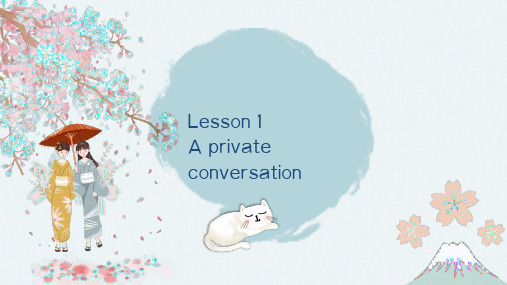
.
n. privacy 隐私.
It's my privacy. It's none of your business!
【反】 public adj. 公共的,公开的 .
New words
conversation n. 对话,谈话
.
have a conversation with sb 和某人有一个谈话 .
New words seat n. 座位 vt. 安排......坐下
. Have/take a/one's seat 请坐
..
请坐的2种说法 : Sit down,please.(命令性) Take your seat,please. (更礼貌)
New words angry adj. ___生__气__的_
Text
‘It's none of your business,' the young man said rudely. 'This is a private conversation!'.
Part 3 Grammar
Grammar
一、主+谓(谓语为不及物动词) The sun rises. He left.
ቤተ መጻሕፍቲ ባይዱ
--
angrily adv.生气地
--
rudely adv.无礼地,粗鲁地
New words
形容词变副词的规则:
1.一般情况下直接加“ly” quick---quickly, loud--loudly, real-really, slow-slowly, careful-carefully 2.以辅音字母加y结尾的变y为i,然后再加-ly happy---happily, easy-easily, busy-busily 3.少数以e结尾的形容词,要去掉e再加-ly true-truly, terrible-terribly,possible-possibly 但绝大多数以e结尾的形容词仍然直接加-ly。例如:rude-rudely, polite-politely, widewidely等。
新概念英语第二册 第1课 (共19张PPT)

get 是逐渐变得的意思,接近become e.g. During the night, it got terribly cold.
4. I couldn’t hear the actor.
hear sb. 听见某人说话 hear from sb. 收到某人来信 hear of sb./sth. 知道某人(某事) hear about sth. 听说、得悉某消息 e.g. I can’t hear you.
summary writing.
1、where did the writer go last week? 2、did he enjoy the play or not? 3、who was sitting behind him? 4、were they talking loudly ,or they talking quietly ? 5、could the writer hear the actors or not? 6、did he turn around or not? 7、what did he say? 8、did the young man say ,“the play is not interesting”or did he say ,“this is a private conversation”?
New words
private
adj.私人的 personal. a private company; private life
conversation
n.谈话 talk have a conversation with sb. e.g. I had a quiet conversation with my closest friend. v. converse交谈
- 1、下载文档前请自行甄别文档内容的完整性,平台不提供额外的编辑、内容补充、找答案等附加服务。
- 2、"仅部分预览"的文档,不可在线预览部分如存在完整性等问题,可反馈申请退款(可完整预览的文档不适用该条件!)。
- 3、如文档侵犯您的权益,请联系客服反馈,我们会尽快为您处理(人工客服工作时间:9:00-18:30)。
私立学校 private school 私下里 in private privation n.丧失;缺乏 privacy n.隐私 2.conversation n.(非正式)谈话 con(共同,一起)+vers(转,旋)+ation
(状态)—一起轮着说话 converse v.谈话 converse with/on/about
辨析:
conversation 指两人或两人以上交谈, 可与talk换用,做复数时指正式交谈 chat 指熟人间的随便交谈,也就是所 谓的“侃大山”。
dialogue 即“对话”,多指剧中的对白 3.theatre n. 剧院 去看戏 go to the theatre cinema 电影院 去看电影 go to the cinema
Good morning! Welcome to
Century Talents!
Listen to the tape and answer the questions:
1.Where did the writer go to last week? He went to the theatre.
2.Why did the writer complain to the people behind him?
Because they were talking loudly and he can’t hear a word.
New words and expressions: 1.private adj.私人的 n.私下,不公开
priv(个人,私人)+ate(…的性质) 私人教师 private teacher 私家车 private car
Please look at me carefully.
句型分析:
7.They did not pay any attention. 析: pay attention to sth/sb pay no attention to ..没有注意 8.It’s none of your business. 析:固定语法---不关你事!
pay attention to sb./sth. at=ad(向,趋向)+tent(伸,拉)+ion
(行为)---把身心去向某人某事—关注, 注意
draw/catch one’s attention 吸引某人注意
8. bear v.(bore /borne)容忍 承受 负担 n.熊
例:我无法容忍他的爆脾气。
I can ’t bear his hot temper. 辨析:bear/stand /put up with bear/stand忍受,遭受,前者语气
较轻,二者常混用
put up with 忍受,容忍(常用于 口语中)
9. business n.事情,生意,公司 例:不关你的事。
It’s none of your business. have no business to do sth. 没权 利做某事
4. seat n.座位 v.安排坐下,使就坐
have a seat/take a seat 就座 (比sit down更有礼貌) have a good seat 有一个好位置 辨析:seat/sit seat只做及物动词,sit可做及物动 词也可做不及物动词
5. play n.戏 v.玩 play… with 和…玩 player 运动员,比赛者 playboy花花公子 6. angry adj. 生气的 angrily adv. be angry with sb. 跟…生气 7. attention n.注意
‘It’s none of your business,’the young man said rudely.’ This is a private conversation!’
句型分析:
6. I looked at the man and the woman angrily.
析:look 为不及物动词,+宾语 要加at. angrily—副词修饰动词
enjoy +doing/sth
句型分析:
4. A young man and a young woman were sitting behind me.They were talking loudly.
析: 过去进行时 结构:was/were+动ing 现在进行时:am/is/are+动ing
句型分析: 5. I got very angry. 析:get angry 系表结构 生某人的气
句型分析:
st week I went to the theatre. 析:简单句。 时间状语+主语+谓语动词+地点
状语 固定短语:go to the theatre
句型分析:
2. The play was very interesting. 析:主语+系动词+表语 interesting 修饰物 interested 修饰人 3. I did not enjoy it. 析:主语+谓动+宾语
be angry with sb 表生气的状态
get angry with sb 表生气的过程
I looked at the man and the woman angrily. They did not pay any attention.In the end,I could not bear it.I turned round again.’I can’t hear a word!’I said angrily.
